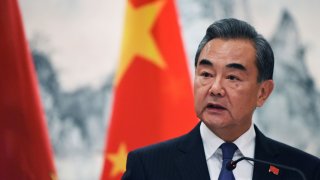
- "The most urgent task at the moment is that both sides should work together and remove all kinds of interference, to achieve a smooth transition of China-U.S. relations," Wang said, according to a CNBC translation of the Chinese text posted on the foreign ministry's website.
- Executives from General Motors, Caterpillar, Visa and other U.S. companies joined the call, according to the foreign ministry.
BEIJING — The U.S. should cease its "interference" in China's domestic affairs in order to improve relations between the two countries, Chinese Foreign Minister Wang Yi told a group of American business leaders on Monday.
Wang spoke via video to the U.S.-China Business Council. According to a foreign ministry statement, executives joining the call included automaker General Motors Chairman and CEO Mary Barra, construction equipment maker Caterpillar Chairman and CEO Jim Umpleby, financial services company Visa President Ryan McInerney, FedEx President and COO Rajesh Subramaniam and American chipmaker Qualcomm CEO Steve Mollenkopf.
President Donald Trump has pursued a tough policy against China using methods such as tariffs and sanctions. President-elect Joe Biden has said he won't immediately remove tariffs, but will aim to work with other countries to put pressure on Beijing.
"The most urgent task at the moment is that both sides should work together and remove all kinds of interference, to achieve a smooth transition of China-U.S. relations," Wang said, according to a CNBC translation of the Chinese text posted on the foreign ministry's website.
Tensions between the U.S. and China have escalated over the last few years, beginning with trade and eventually spilling into technology. The Trump administration has tried to address longstanding complaints that China engages in unfair trade practices such as forced technology transfers.
Money Report
Beijing's claim on Taiwan and its increased control of the semiautonomous region of Hong Kong — both issues China considers domestic — are among points of contention with the U.S. as well.
'Avoid an escalation'
Wang claimed he supports increasing communication and improving public discourse about the two countries through various channels including media. He also laid out areas for more cooperation such as developing a Covid-19 vaccine and new energy sources.
"The U.S. should also abide by the norms of international relations, not frequently intervene in China's internal affairs and not hinder Chinese people's right to pursue a better life," Wang said. "For issues that cannot be resolved in the near term, (we) must take a constructive attitude of management and control to avoid an escalation that affects China-U.S. relations overall."
With less than two months to go before Biden's scheduled inauguration on Jan. 20, the Trump administration has maintained its pressure on China. Last week, the Pentagon added four Chinese companies to a blacklist, while the State Department ended five China-related cultural exchange programs that it deemed "soft power propaganda tools" over the weekend.
"China's top leadership continues to support engagement with business leaders from American industry during a year of heightened tensions," Matt Margulies, vice president for China Operations at the U.S.-China Business Council, said in a statement to CNBC. "This sends a necessary, positive signal to Chinese industry that, despite tensions, it's okay for US and Chinese companies to do business together."






